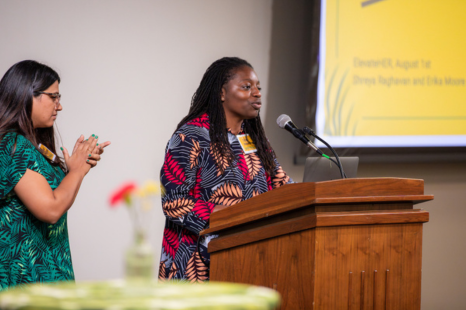ElevateHER: Engineering Solutions for Women’s Health
The ElevateHER Conference was hosted at Texas A&M University and co-chaired by Erika Moore, Assistant Professor in the Fischell Department of Bioengineering (BIOE) at the University of Maryland (UMD), and Shreya Raghavan, Assistant Professor in the Department of Biomedical Engineering at Texas A&M.
“ElevateHER brings engineers together to innovate in the women's health space. One of our goals was to help engineers apply themselves to a broad definition of women’s health: it is all conditions that disproportionately impact women across their lifespan, and not just reproductive health,” adds Raghavan. “So many things are women's health, but they're not considered that way, like cardiovascular and bone health and sex differences in immunity.”
“We hope the event will call more attention to methods in which we can create standards for investigating women's health and establish clear needs to address this crucial gap in medically focused research,” says Moore. The event featured two panel discussions: one on the access and visibility of biomedical engineering technologies in women’s health and another on synthesizing future steps. “ElevateHer was unlike any other conference I’ve been to—it was a small group of current and up-and-coming leaders in the field of women’s health from academia, industry, and government, including program officers,” says BIOE Assistant Professor Jenna Mueller, who participated as a keynote speaker on the strategic planning panel for the future of women’s health. “It was helpful to acknowledge together that the field of women’s health has been underfunded and to identify ways we could continue to push the field forward together. I’m very grateful to be a part of this group to ‘elevate her!’” Juan Gnecco, an Assistant Professor from Tufts University and a panel moderator, has been researching the uterine endometrium since 2013 and expressed excitement about the merging of engineering and women’s health. “The world of engineering has many sub-disciplines and the world of women's health has many sub-disciplines, so a place where there can be that cross-pollination across needs, ideas and solutions is the key facet of this type of conference,” Gnecco said. “It's to establish the connections and unify those techniques, those methods, those goals, to try to merge those fields.” Panelist Dr. Stephanie George, program director for Engineering of Biomedical Systems at the NSF, encouraged researchers interested in women’s health to pursue their ideas and proposals.
Round table discussions at the conference covered a variety of topics like the uterus and gynecology, female cancers, immunity, sex and demographic determinants, cardiovascular and musculoskeletal biology, maternal health, transitions with age, and outreach and advocacy. “It was so rewarding to see all of the key stakeholders take charge of what we want to happen next: interactions with editors, interactions with funding agencies, and next steps regarding outreach and communication,” says Moore. “It was revitalizing to see all of us chart the next steps and plot the future of biomedical engineering in women's health.”
“Everyone can be involved in supporting women's health research,” emphasizes Moore. “The entire field of bioengineering can have a huge impact—even if it just begins with considering who is impacted by the malady you are studying. For so long, the diseases that particularly impact women have been overlooked in biomedical science; there is a lot of opportunity for fundamental discoveries that can transform our understanding.”
Related Articles: September 16, 2024 Prev Next |
|


 In response to a
In response to a  The conference aimed “to engage key stakeholders working on biomedical innovations in women's health and to articulate next steps to further catalyze transformative efforts in women's health within the biomedical engineering discipline,” explains Moore.
The conference aimed “to engage key stakeholders working on biomedical innovations in women's health and to articulate next steps to further catalyze transformative efforts in women's health within the biomedical engineering discipline,” explains Moore. Additionally, the conference centered around creating actionable next steps to sustain the conversation on women’s health beyond ElevateHER.
Additionally, the conference centered around creating actionable next steps to sustain the conversation on women’s health beyond ElevateHER. “Much of what NSF supports is investigator-driven, so we can't give awards that impact women's health if those proposals don't come in,” she said. “Submit proposals. Many core programs, like mine, will accept proposals with impact in women’s health if the scientific or engineering innovation aligns with the program. Don't be afraid to submit the proposals.”
“Much of what NSF supports is investigator-driven, so we can't give awards that impact women's health if those proposals don't come in,” she said. “Submit proposals. Many core programs, like mine, will accept proposals with impact in women’s health if the scientific or engineering innovation aligns with the program. Don't be afraid to submit the proposals.” Next steps for Moore and Raghavan include co-hosting a workshop on women’s health at the
Next steps for Moore and Raghavan include co-hosting a workshop on women’s health at the